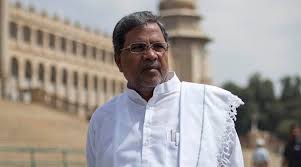Bengaluru, Jul 30: Even when 39-year-old Rakesh, the elder son of Karnataka chief minister Siddaramaiah, was lying on his deathbed in Belgium, the latter got no sympathy from the Kannada television channels and the other media in the State.
 The regional news channels began to target the CM the moment he left for Belgium to visit his ailing son, who was in an extremely critical condition since Tuesday.
The regional news channels began to target the CM the moment he left for Belgium to visit his ailing son, who was in an extremely critical condition since Tuesday.
“Bengaluru is reeling under floods, but our CM is enjoying with his son in Europe,” claimed one insensitive Kannada channel report on Friday. The hyped reports elicited strong response from some people on social media.
“This is height of insensitivity and sadism. India is burning for past two years. But, PM Narendra Modi hardly visited his own country. No channels raised objection to his frequent foreign trips. When Siddaramaiah visited his hospitalised son, these dogs of Sangh Parivar started barking,” posted Gayatri, a Bengaluru resident, on her Facebook wall.
“Hello, media men! If your children die, don't you visit them? Will you keep screaming inside idiot boxes?” tweeted Sapna from Hassan.
On the other hand, a few BJP workers continued to target Mr Siddadaramiah on social media even after his son breathed his last on Saturday.
“Oh, finally Siddu's son is dead. Sad News for Congis and good news for people (sic),” tweeted a self proclaimed Sangh Parivar activist. His tweet received a few likes from his followers. Meanwhile, the screen shots of such abusive comments started going viral on WhatsApp too.
Also Read:
Karnataka CM Siddaramaiah's son Rakesh, 39, dies in Belgium hospital
I can understand Siddu's pain, I too have lost my son: Sadananda Gowda





Comments
Media has shown its real face. I express my deep condolence to Hon'ble CM on death of his beloved son. May God bless our CM with patience. Media is really sold itself as a prostitute. Shame on you guys.
Shame on Indian Media
Instead the press need to reveal the details of the trip...what kind of dance party in belgium?....alcoholism is the leading risk for pancreatitis.....why would he go to a party with 4 friends leaving his wife and kids?...
ruthless, extremely sick journalism, watching tv news is waste of times...
Add new comment